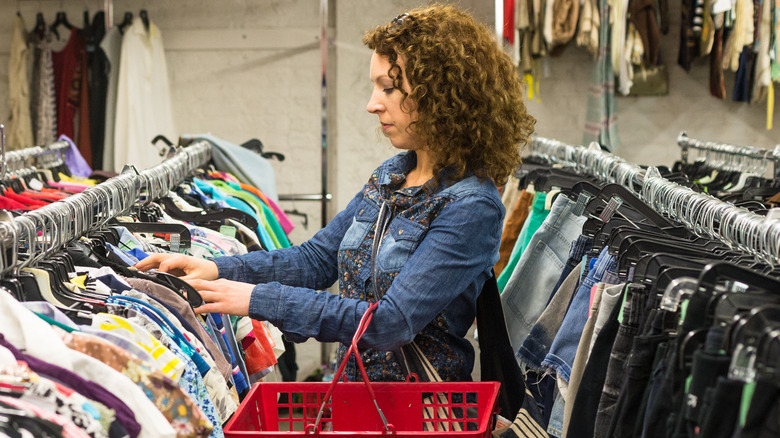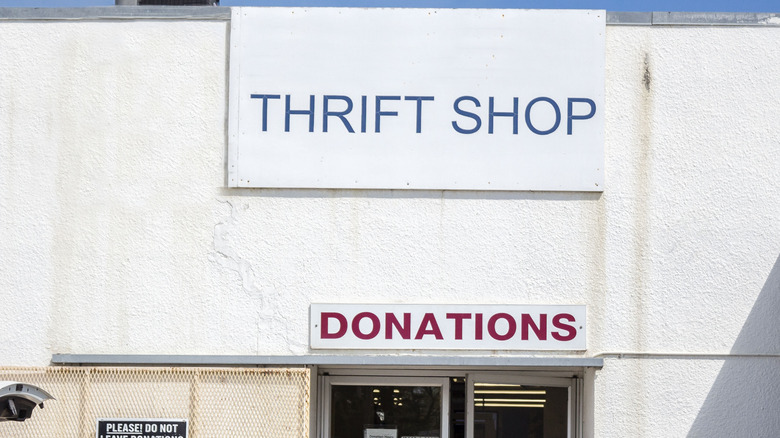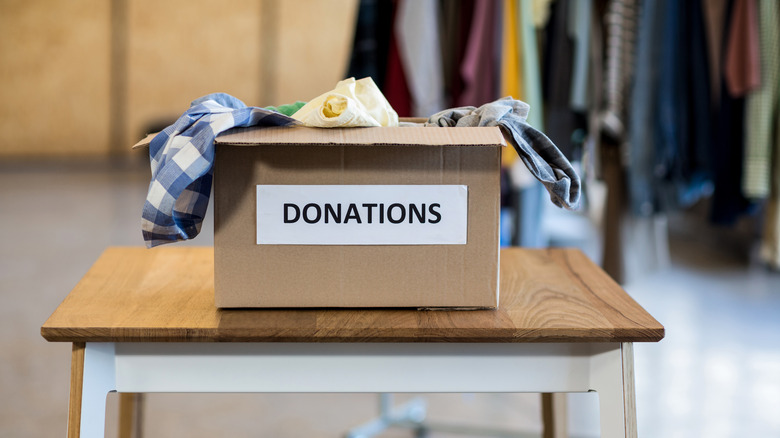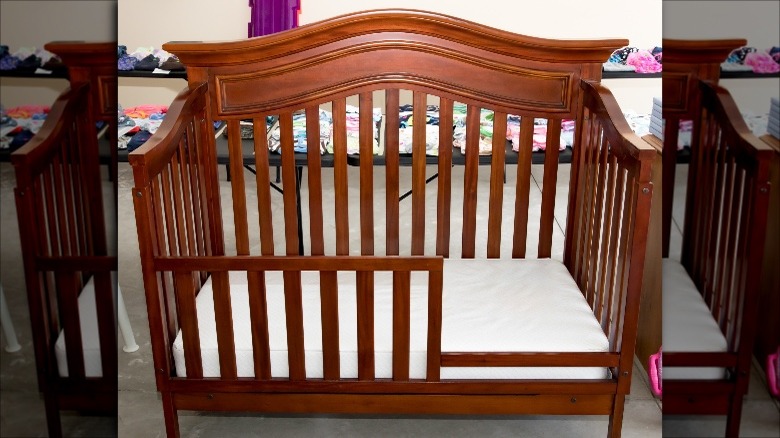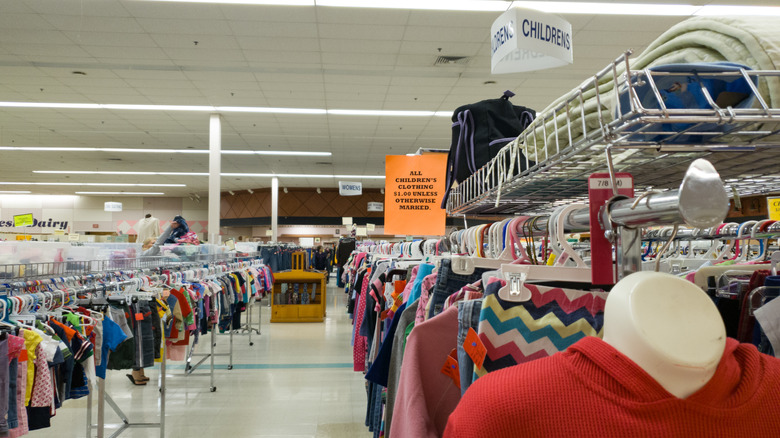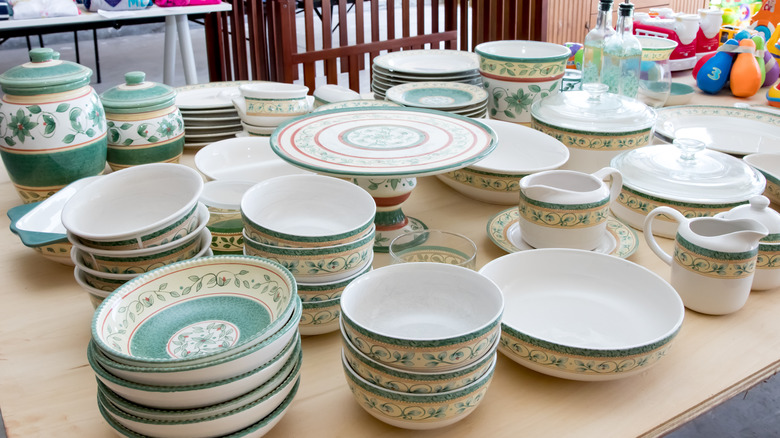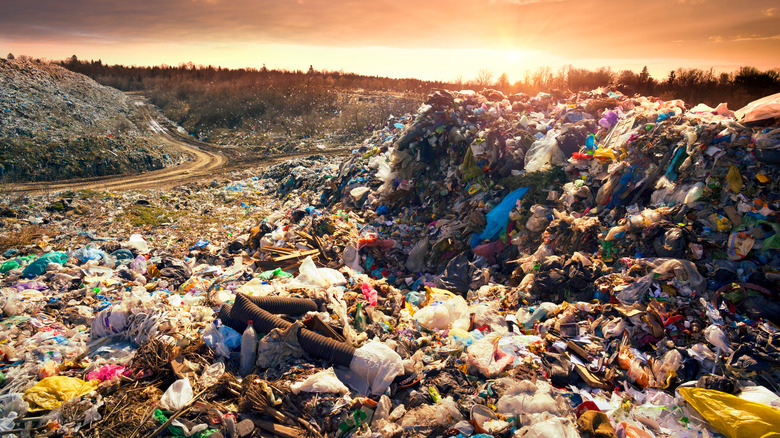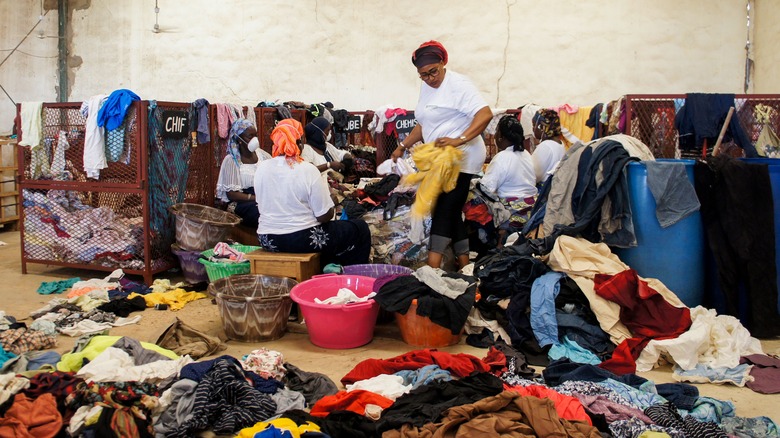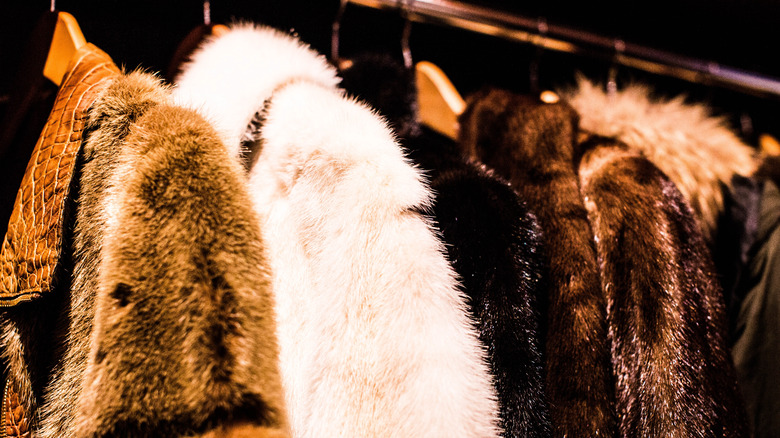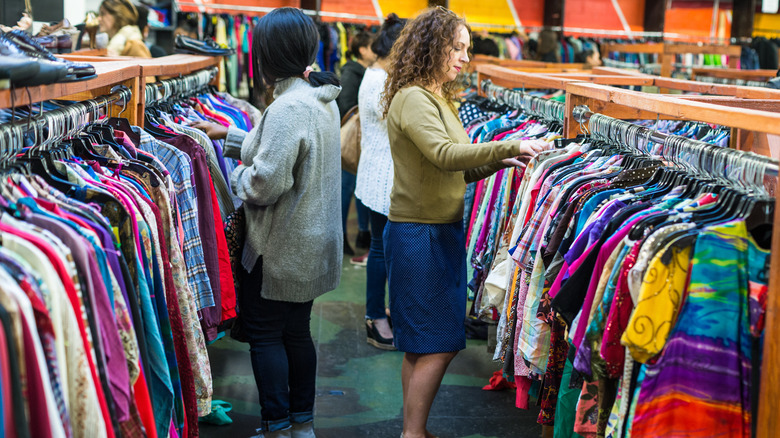The Dirty Truth About Thrift Stores
If you've never been, thrift store shopping can seem intimidating. "For a long time, thrift stores felt pretty chaotic to me," Jessica Olsen, a one-time thrift store avoider-turned-thrifter, told Rewire. "They just don't feel super organized... I got really overwhelmed really quickly." But once you learn the tricks of the trade — like shopping on the weekdays and keeping an open mind — you can find plenty of secondhand gems for a fraction of their original cost. And doing so can help you learn ways to look classy on a budget.
Thrift store shopping, or "thrifting," isn't exactly new, but we are in what Fast Company's Elizabeth Segran calls "the golden age of secondhand shopping." She's not wrong. According to ThredUP's 2019 Resale Report, there are "more secondhand shoppers than ever before," with millennials and Gen Zers leading the movement.
It's a fact that buying pre-owned clothing is far and away more sustainable than purchasing trendy fast fashion, and consumers are becoming increasingly conscious of buying in a sustainable and ethical way. That said, there are a few things you'll want to keep in mind about thrift stores before you dive in. This is the dirty truth about your favorite secondhand shops.
Not all thrift stores are nonprofits
Some of the biggest thrift stores (like Goodwill and The Salvation Army) are nonprofit organizations, but it's a common misconception that all thrift stores are nonprofits. As it happens, many thrift stores are for-profit. If you're looking to support your community, it pays to pay attention.
"Most nonprofits are pretty proud of their mission, and their financial data is generally pretty transparent too," Kristen McCormack, director of Boston University's nonprofit management program and the creator of the nonprofit organization Boston Food Bank, revealed to Mic. "[For-profit companies'] primary responsibilities are to their shareholders."
Nevertheless, some for-profit thrift stores donate to charity. "Most of our stores have a different local charity to receive donations every day of the week," Stephanie Lew, marketing director of the for-profit thrift store conglomerate Buffalo Exchange, told Mic. Beacon's Closet, a for-profit New York City thrift store chain, also donates clothing they are unable to sell to various charities. According to the company's site, Beacon's Closet has donated over $100,000 to charity as of August 2019. Your local thrift store may donate to charity more, less, or not at all, so you may find it beneficial to do some digging.
The profit side of nonprofit thrift stores
In 2015, Value Village thrift stores were sued for "misleading people about how much of their donations actually go to charities and concealing its role as a for-profit company," The Seattle Times reported. In late 2019, a judge ruled that the organization had indeed violated the law and misled its customers into believing the stores were not for profit.
These sorts of laws help protect consumers, of course, but it's important to note that even bona fide nonprofit thrift stores don't donate all of their money to charity or use all of it on their programs. The Better Business Bureau stipulates that nonprofits must "spend no less than 65% of total expenses on program services." This means there's a lot of variables in how nonprofits can use the rest of their revenue.
"About 90 percent [88 percent] of our revenue goes towards job training and sustainability," Ted Chellis, Goodwill Stores district manager, told News 13. Additionally, 11 percent is set aside for administration costs and a small percent is for fundraising. The Salvation Army, on the other hand, spends 75 percent on programs, Charity Navigator's Sandra Miniutti confirmed to NBC News.
There can be huge pay disparities when it comes to thrift stores
Goodwill is very charitable, but wage disparity is an ongoing issue plaguing this particular nonprofit thrift store. Citing federal tax records, The World-Herald reported that Goodwill Omaha paid CEO Frank McGree nearly $1 million ($933,444) in 2014. In addition to his quarter-million base salary, he was given a $95,000 incentive bonus, $52,000 in deferred retirement, and a retention bonus of $519,000. Oh, and a membership to a country club. Additionally, 13 other executives and managers received yearly salaries of over $100,000 that same year.
Considering Goodwill is a $6.1 billion industry, you may reason that they simply pay their employees well. Not so fast. Apparently, this does not apply to all employees. While some higher-ups were making bank, many disabled employees were earning as little 22 cents an hour, according to Forbes — well under minimum wage, due to the legal loophole in the Fair Labor Standards Act. "If you can afford to pay six- and seven-figure salaries to your executives," Autistic Self Advocacy Network president Ari Ne'eman reasoned in a statement (via Forbes), "you can afford to pay minimum wage to your employees."
Gross things often make it into donations at thrift stores
Whether you shop at Goodwill, The Salvation Army, or any other thrift store — be it nonprofit or for-profit — there are bound to be some less than pleasant finds. Thankfully for customers, most of these are caught before making it out onto the floor. Of course, this still royally sucks for the employees. As such, they recommend you take care not to donate anything of the nasty variety.
"The challenges for us are probably things that are, for lack of a better term, gross," Tamarind Tidwell, general manager of Boomerangs, a chain of thrift stores in Massachusetts run by AIDS Action, revealed to Today. "So, things that have been sitting out in your yard for too long or are moldy, (mildewed), damp ... if we get one of those, even in a batch of clothes, it can easily ruin other things. It means we can lose out on donations."
Chances are your local thrift stores are selling something hazardous
Many thrift stores list their do's and don'ts about donating. Goodwill, for example, doesn't accept large appliances like stoves, nor do they take CRT (aka old-style) televisions "due to the Digital TV Transition." It may go without saying, but thrift stores also don't want to be burdened with hazardous materials. "Some [Salvation Army] locations have banned entire categories of items, as the hazards associated with accepting them outweigh the benefits," Tim Raines, marketing manager at The Salvation Army, explained to Reader's Digest. However, this isn't exactly foolproof.
If you hit up your local thrift stores on a regular basis, you've probably seen some items that caused you to turn your head. Other times, though, you may not even realize when something for sale poses a health hazard.
According to a study conducted by the United States Consumer Product Safety Commission (CPSC), 69 percent of thrift shops visited contained at least one hazardous product. This varied from children's clothing with drawstrings that did not meet CPSC guidelines, cribs that did not meet federal safety standards, and old hairdryers that did not have the mandated safety plug. So it may just be best to avoid buying certain things when at thrift stores, especially when it comes to baby items.
Recalled items end up on the shelves at thrift stores
"What many of our donors don't realize is that we have strict rules to follow," Major Jerry O'Neil, who assists in overseeing the The Salvation Army Stores in Minnesota, revealed in an interview with the nonprofit. "Breaking these rules can result in costly fines or lawsuits." He continued, saying, "Most importantly, these rules protect our shoppers. Safety is our number one priority." The Salvation Army further revealed that federal inspectors often pay visits to their stores to make sure the organization isn't selling anything that's been deemed hazardous or has been recalled.
This is true of other thrift stores as well. "Donors should check the Consumer Product Safety Commission to verify if an item has been recalled prior to making a donation as well as check with their local Goodwill," Brian Itzkowitz, head of Goodwill Industries International's retail operations, told Today.
Nevertheless, recalled items do have a way of winding up on thrift store shelves from time to time. Of the thrift shops examined by the United States Consumer Product Safety Commission (CPSC), many had recalled items for sale, including children's toys.
When shopping at thrift stores, remember that vintage can also mean lead
If you're a collector of vintage items, a secondhand store can be a goldmine. However, there are plenty of risks lurking in many aisles of your favorite thrift shop. "The sale of used items in the United States is not regulated by any federal agency and as a result, it is possible that Americans are bringing the lead poisoning hazards of past generations back into their homes," researcher Laurel Sharmer of the State University of New York shared, as reported by Oregon State University. "It is very important for consumers to understand that you can't tell if a product contains lead by looking at it."
As part of a study on secondhand items purchased from thrift, junk, and antique stores in Virginia, New York, and Oregon, Sharmer and her team found that many of the items contained surface lead concentrations some 700 times higher than the federal limit. These items varied from ice cream scoops to necklaces to window shutters.
If you plan to buy vintage items from your thrift store, you shouldn't assume they're safe. Consumer advocate and founder of Dime Will Tell, Dustyn Ferguson recommends "always [testing] for lead."
Some of your donations to thrift stores end up in the garbage
Even if every donor takes care to donate responsibly, thrift stores can't sell everything. At times, this is because the condition of the donation isn't deemed fit for resale or it could just be that the store doesn't have the floorspace.
Stacie Morrell, manager of Homeward Bound Pets Thrift Store in Oregon, said the store where she works has a system for such donations. She told Mental Floss that the best items are taken to a consignment store whereas items that were displayed but didn't sell are sent to a larger thrift store. Any clothing that doesn't meet the store's guidelines are given to local homeless shelters or a recycling facility.
According to Morrell, who also worked at Goodwill, the large nonprofit works a bit differently. The items that don't sell or are deemed unfit for resale are sent to Goodwill Outlets, where customers can then buy items by the pound. Sadly, even if you hoped your items would avoid going into a landfill, that is the last resort for donations. "They have huge garbage bills every month, into the millions," Morrell said of Goodwill.
Thrift store donations may get shipped overseas
Things that don't end up selling at thrift store outlets then hit the Goodwill auctions. Next, items that weren't able to find homes with lucky bidders are sent to a textile recycling organization, according to Kyle Stewart, director of donated goods retail for Goodwill.
Kathy Walsh, a spokesperson for Secondary Materials and Recycled Textiles (S.M.A.R.T.) Association, revealed to HuffPost that 30 percent of what their organization receives gets processed into industrial rags, 20 percent is shredded into soft fiber filling for furniture and other items, and 5 percent is sent to the landfill.
However, the majority — 45 percent — of the clothing that ends up at S.M.A.R.T. is either re-sold within the United States' clothing industry or shipped overseas. While this may sound better than getting sent to the landfill, the publication pointed out that "re-selling clothes into the U.S. secondhand market just encourages them to make the cycle all over again" and "sending clothes overseas can majorly hinder the textile industries in developing countries, robbing locals of jobs and income."
There's a reason for that thrift store funk
When you venture into a thrift store, you get a whiff of a very distinctive smell. "It's a musty odor, a smell of decay," John Mahdessian, owner of the New York-based dry and specialty cleaning store Madame Paulette, told The New York Times. "It's funky!" Katie McDonnell, owner of Nomad Vintage in New York City, doesn't think it's always a bad odor. "Good vintage smells a wee bit musty, but more like a whiff of wool or your grandmother's attic," she explained. "Maybe just the slightest hint of a cigarette smoke from a party; more like a life well-lived than anything gross."
Incidentally, scientists actually analyzed the molecules that make up this quintessential scent and found that the vast majority were from body oils like sweat. Eek. The remaining scents were various compounds of perfume, food, gasoline, and other everyday contaminants.
A thrift store smell may be fine for, you know, a thrift store, but you may not desire to wear that scent. However, dry-cleaning isn't always going to solve the problem. "If it smells bad, don't buy it unless it will hold up to a rigorous washing," McDonnell advised.
Clothing isn't laundered before hitting the racks at thrift stores
Okay, so thrift store clothes may have an odd smell, but thrifting connoisseurs still recommend trying on secondhand clothes before buying. "It really helps to see the clothes draped over a body," Amber Bartlett, the owner of online resale shop Western Wicker, told Rewire. "I always try on everything that I'm going to buy, regardless of if it's 10 sizes too big or small," she said. "Sometimes, I even try stuff on over my clothes — I'll just wear a tank top and leggings. Just stick with what makes you comfortable."
Trying on clothing at a thrift store may give you the heebie-jeebies — and quite rightfully so. Tamarind Tidwell, general manager of Boomerangs, a chain of thrift stores in Massachusetts run by AIDS Action, admitted to Today that most thrift stores don't wash clothing donations before they're put up for sale. Hmm, it's no wonder they hold on to their scent. But if you want to be what Tidwell dubs a "superdonor," be sure to give your clothes a good laundering before boxing them up.
When shopping though, just be sure to wash clothes well before wearing them after you take them home. There's a good reason to wash your thrift store buys and it's not just because of their smell.
